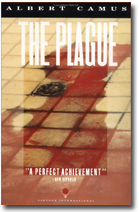Books |
Albert Camus: The Plague
By
Published: Feb 24, 2020
Category:
Fiction
If you were taking something like 20th Century Thought, you read it in English.
If you were studying French, you struggled through it in the original.
Either way, the pages are, for you, spoiled by the chalk dust of the classroom.
What you were supposed to get out of it is this: The novel is an allegory, ultimately about the spread of Nazi ideology and a community’s reaction to that deadly invasion. It asks: How should people act when faced with a daily threat to life? How can they survive when an arbitrary fate marks some for immediate death, others for a later grave? What do we owe our neighbors? And, in the end, what does it all mean?
The last time I thought about “The Plague” was after Hurricane Sandy. And what I thought about was the flooded subway system — so flooded downtown that the rats were forced above ground. They breed fast, and they carry diseases, including viruses. More rain we might all have had reason to pick up "The Plague" again.
Clearly “The Plague” has meaning beyond the horrors of Nazism, or Communism, or any system that eats freedom for breakfast. It’s about a literal plague: a disease that kills people. And about how we respond to a plague — that is, what resources do we bring to the struggle, and do they make a difference? [To buy the paperback from Amazon, click here. For the Kindle edition, click here.]
The good news: "The Plague" is a better book than the one they talk about in schools. For one thing, it has a remarkably sympathetic narrator in Dr. Rieux, who is the first to notice something amiss — rats appearing in unlikely places, their bodies twitching and blood spurting from their mouths. Rieux’s wife has just gone to a French sanitarium in the hope of a cure for her tuberculosis; confinement is much on his mind.
Oran, Algeria — the coastal city where Camus lived in 1942, and his setting for his novel — may overlook water, but its energies are dull and worldly. People worship money and devote all their time to making it. Love flourishes briefly, then dissolves into habit. Government is inefficient and formal; it is slow to conclude that frothing rats and dying people have any connection.
In short, a thoroughly modern city.
Less good news: "The Plague" isn’t exactly fun to read. How could it be — this is the account of a doctor who spends twenty hours a day watching people die. And yet it’s hard to put the novel down, for it describes — with great precision — the stages of this kind of disaster. At first, Dr. Rieux notes, people were "worried and irritated." Their first reaction: "to abuse the authorities." (Sound familiar?) Later, we hear that "officialdom can never cope with something really catastrophic." (Where have you heard that before?) "The newspapers, needless to say, complied with the instructions given them: optimism at all costs." (That was back when media conspired with government to keep the citizenry docile. No more. Now media competes to see who can terrify us the most.)
The very good news: The book really achieves greatness in the last 50 pages, where Camus spells out the origin of the plague (it’s in us, in each and every one of us) and what that means for our lives together. There’s great tenderness beneath this savage analysis — Camus applauds "the passionate indignation we feel when confronted by the anguish all men share."
Camus sees the fight against terror as "never ending." But fighting it is our lot, indeed our glory.
“But what does it mean, the plague? It’s life, that’s all.”
Can anything save us?
“…a loveless world is a dead world, and always there comes an hour when one is weary of prisons, of one’s work, and of devotion to duty, and all one craves for is a loved face, the warmth and wonder of a loving heart.”
Camus praises "human love," but that doesn’t seem equal to the cruel challenges of malevolence.
He tries again: "We learn in times of pestilence….there are more things to admire in men than to despise."
That message — harsh and lyrical, terrible and ennobling — is worth a hundred bromides from the pundits and politicians who have bludgeoned the airwaves with solutions that solve nothing.
“And indeed it could be said that once the faintest stirring of hope became possible, the dominion of plague was ended.”
“The Plague” is 308 pages of pure sanity. And who wants that?


